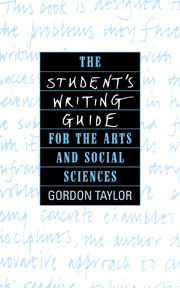Book contents
- Frontmatter
- Contents
- Preface
- Sources of extracts used in the text
- 1 Introduction
- Part I Reflection and Research
- Part II The Dynamics of an Essay
- Part III Language
- 7 You, your language and your material
- 8 Analytical language I: sentences
- 9 Analytical language 2: rhetorical strategies
- 10 Cohesion and texture
- 11 Conventions of academic writing
- Appendices
- Index
7 - You, your language and your material
Published online by Cambridge University Press: 29 January 2010
- Frontmatter
- Contents
- Preface
- Sources of extracts used in the text
- 1 Introduction
- Part I Reflection and Research
- Part II The Dynamics of an Essay
- Part III Language
- 7 You, your language and your material
- 8 Analytical language I: sentences
- 9 Analytical language 2: rhetorical strategies
- 10 Cohesion and texture
- 11 Conventions of academic writing
- Appendices
- Index
Summary
How can we know the dancer from the dance?
w. b. yeatsOne of the main themes in this book has been that an essay is your best answer to a question. If the essay is to be your answer, rather than the answer or an answer or someone else's answer, it is necessary to start paying close attention to some of the problems that arise in your use of language as you strive to establish a relationship with the material you have to mould. In this chapter we shall study a few of these problems. The first is an old bugbear — whether one should use ‘I’ in an academic essay. But there are others which can just as easily arise if you are uncertain about your position as a scholar and writer — if you tend to assume or try to pretend that you have no significant part to play in putting a construction on the material you find in your sources.
Subjective and objective: the uses of ‘I’ and ‘we’
There is much confusion, not just in students' minds but in tutors' too, on whether ‘I’ and ‘we’ may be used in academic writing. Some tutors encourage you to be direct in your writing and to use ‘I’.
- Type
- Chapter
- Information
- The Student's Writing Guide for the Arts and Social Sciences , pp. 143 - 160Publisher: Cambridge University PressPrint publication year: 1989



